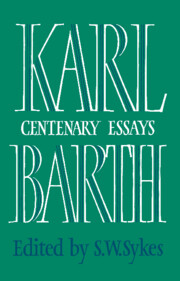Book contents
- Frontmatter
- Contents
- Note on the text
- 1 Introduction
- 2 Karl Barth's eschatological realism
- 3 The triune God and the freedom of the creature
- 4 Authority and openness in the Church
- 5 Ad Limina Apostolorum in retrospect: the reaction of Karl Barth to Vatican II
- 6 The reception of the theology of Karl Barth in the Anglo-Saxon world: history, typology and prospect
3 - The triune God and the freedom of the creature
Published online by Cambridge University Press: 26 February 2010
- Frontmatter
- Contents
- Note on the text
- 1 Introduction
- 2 Karl Barth's eschatological realism
- 3 The triune God and the freedom of the creature
- 4 Authority and openness in the Church
- 5 Ad Limina Apostolorum in retrospect: the reaction of Karl Barth to Vatican II
- 6 The reception of the theology of Karl Barth in the Anglo-Saxon world: history, typology and prospect
Summary
THE FREEDOM OF GOD
‘He who sits in the heavens laughs; the Lord has them in derision.’ So does the writer of the second Psalm depict the attitude of his God to the nations. This independence of God, the unique and untrammelled freedom of the Lord, is the theme of other Psalms, too. In face of any suggestion that God may in some way need human devotion, Psalm 50.12 reproduces the scoffing tones we have already met: ‘If I were hungry, I would not tell you; for the world and all that is in it is mine.’ Not only is God free from such concerns; his is also a positive liberty: ‘Our God is in the heavens; he does whatever he pleases’ (Ps. 115.3). These expressions, reflecting as they do a strong strand of the biblical tradition of thought about God, sit rather uncomfortably with some of today's currents of thought, which do not like such forthright assertions of the divine supremacy. But Karl Barth knew better, as the following characteristically lyrical passage makes clear.
- Type
- Chapter
- Information
- Karl BarthCentenary Essays, pp. 46 - 68Publisher: Cambridge University PressPrint publication year: 1989
- 1
- Cited by



